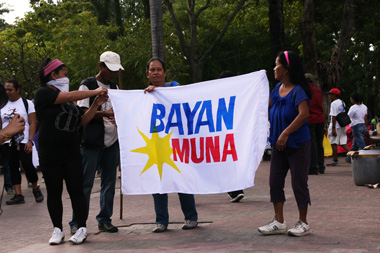DAVAO CITY, Philippines – Now that it has happened, the question remains: can former President Rodrigo ‘Digong’ Duterte serve as mayor even if he’s 11,000 kilometers away from Davao City?
Duterte, detained in The Hague as he faced trial at the International Criminal Court for his war on drugs killings, won by a huge landslide in the mayoral race last May 12. The tough-talking Duterte received more than 660,000 votes, significantly surpassing the 80,000 votes received by Karlo Nograles, his former Cabinet Secretary.
Dabawenyos saw his victory as a protest against his detention. Notwithstanding surveys favoring Duterte’s prosecution, Dabawenyos see ‘Tatay Digong’s’ detention as political persecution of the Duterte dynasty from the Marcos Jr. administration, where they were previously allied until the fallout from the confidential funds issue of Vice President Sara Duterte.
Even with his arrest and flight to The Hague, the Commission on Elections (Comelec) did not disqualify the candidacy of Duterte, as there is still no conviction in his trial.
Duterte’s victory now presents a constitutional dilemma: can he hold the position of mayor of Davao while detained in a foreign country? This has stirred many conversations and online jokes saying he will “work from The Hague,” a spin from the pandemic-era practice of “work from home.”
Constitutionalist and former dean of the Ateneo School of Governance Tony La Viña, explains that there are three steps that Duterte must take before he can officially serve as Davao’s mayor.
Duterte has already done the first by being proclaimed the winner of the Davao City election. “His presence is not required for such a proclamation,” La Viña explained.
The second step is the difficult one: where can Duterte take his oath, and who will administer it?
“The oath taking must be done on Philippine soil,” La Viña said. Thus, Duterte has to take an oath in the Philippine Embassy in the Netherlands and before a government official with authority.
The official can be “the ambassador or any other official, like a Barangay captain from Davao or his daughter, who is vice president.”
But whether the ICC or the Marcos government would grant this oath-taking remains to be seen.
“The Philippine government must agree to this, and the ICC must also allow it. Practically, therefore, the answer is no. Why would President Marcos allow it? And why would the ICC permit it, establishing a negative precedent for other detainees?”
La Viña said that even if Duterte succeeds in taking his oath, the third step, which is to assume office in Davao’s City Hall, is also impossible.
“Even if he does succeed in taking his oath, which he must do in six months after the election, he cannot assume office, as that requires physical presence in Davao City,” the constitutional lawyer said.
“How will he sign the papers that signify that he will now assume office? That he will make decisions, like the budget? How can he do that when he is in The Hague”? La Viña made this statement during a separate radio interview.
In this event, La Viña said it will be the elected vice mayor, who is Duterte’s son, Sebastian “Baste,” who will assume the role of acting mayor. In the order of succession, the elected city councilor with the highest number of votes in the recent election will assume the vice mayoral post. The top councilor is the neophyte grandson of Duterte, Rodrigo ‘Rigo’ II.
La Viña said that under Comelec rules, if Duterte doesn’t take the oath within six months after his proclamation, Sebastian will be declared as the mayor of Davao.
Sebastian was elected mayor in 2022, but his leadership has been questioned due to his lack of presence in City Hall and engagement with stakeholders in Davao City.
Comelec officials also said that the decision on this matter rests with the Department of the Interior and Local Government (DILG).
Legal experts note that Duterte’s case is unprecedented, but La Viña believes the mayor’s victory will affect his ICC case more on the political side, as Duterte claims that the case is politically motivated.
But Duterte’s war on drugs, which started during his mayoral term in the late 1990s and was elevated on a nationwide scale during his presidency, is reported to have killed more than 30,000 people. Complainants in his ICC case pointed out most killings were done without due process to suspects, some framed in the “nanlaban” narrative, and some victims involved minors. (davaotoday.com)









